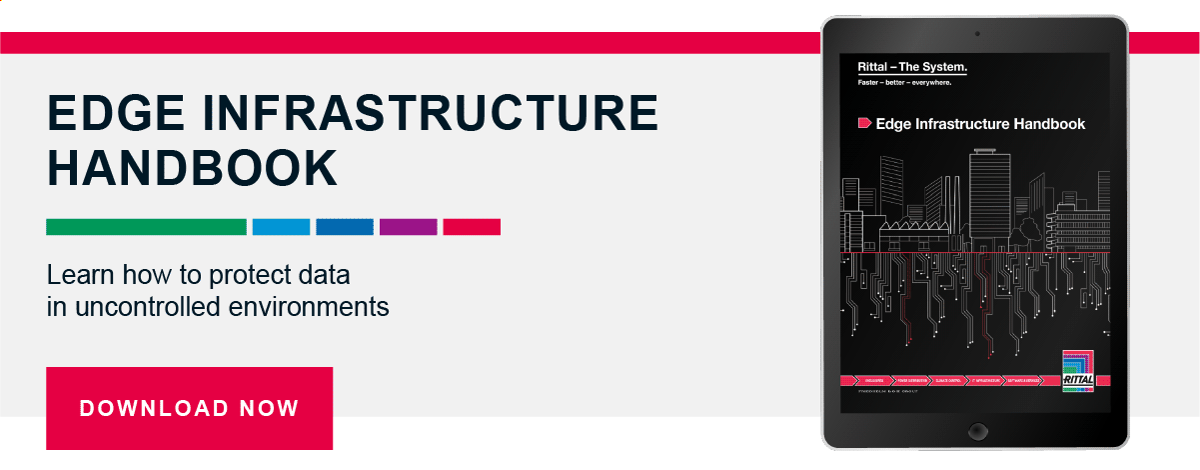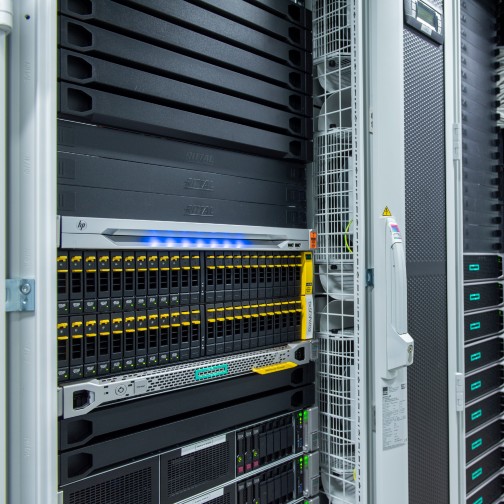The manufacturing world will never be the same. The new possibilities offered by Industry 4.0 and networked mobile data — deploying IT at large scale efficiently, quickly and remotely — changes the way physical infrastructure is deployed and managed in any space that is not really an IT space.
Combining very low latencies with the ultimate in computing power and reliability, modular Edge data centers, also called micro data centers, can process significant volumes of generated data at a local level. Although this is their main function, they provide other valuable benefits, too.
Benefits of Modular Edge Data Centers
1. Super Speed to Deploy
Most modular Edge data centers are fully designed, configured, tested, and certified in-house for operation in just 3 to 5 months, ready for deployment (more on deployment in #3). Traditional data centers can take 18 to 24 months to build.
Modular Edge data centers are a quick way to add computing power when and where it is too expensive to build a static data center.
2. Money Savers
Compared to a traditional data center, modular Edge data centers can cost 20 to 30 percent less to build because they are made with standardized components (building is easier and less expensive).
Plus, modular Edge data centers are more energy efficient (read more in #4), saving more money down the road.
3. Easy Deployment
Small-footprint, pre-assembled modular Edge data centers can be built offsite, including the necessary infrastructure — network/server racks, UPS (uninterruptible power supply) equipment, batteries, switchgear, cooling equipment, fire suppression systems, and monitoring systems — so just plug in, and it is good to go.
Because they are self-contained, modular Edge data centers can be designed for many different environments, which makes them perfect to deploy in uncontrolled or remote locations, although modules can be grouped together for larger sites.
4. Cooling and Power
Modular Edge data centers have scalable capacity, allowing for many power and cooling options. Although the deployment’s needs determine what cooling solution is most effective, superior air flow management typically enhances cooling efficiency. To ensure uptime, a modular Edge facility may use various power distribution solutions, including utility power hookups, UPS equipment, and standby generators.
Modular Edge data centers utilize space wisely and contain features that enhance efficiency (sealed floors, walls, and doors, plus overhead or under-floor cooling), making them more energy-efficient than static data centers. Use of precision airflow allows these data centers to support upwards of 20 kWh per cabinet.
5. Security and Fire Protection
Delivered with fire suppression systems and security built-in, modular Edge data centers connect with enterprise security systems and integrate with overall data center monitoring solutions. All critical functions — cooling, power, fire protection, security, and IT equipment — should be connected through IoT devices and monitored from a remote location, preferably through Data Center Infrastructure Management (DCIM) software.
Is a Modular Edge Data Center Right for You?
Use these three criteria to begin evaluating your needs. They will help you determine if deploying a modular Edge data center makes good sense.
1. Is fast deployment critical?
There are situations when rapid asset deployment is the highest priority. With modular Edge data centers, various phases of the project can be implemented simultaneously; e.g., the module’s cement pad can be poured at the same time the module is being built.
Other processes are expedited, too. Local authorities aren’t needed for regulatory approvals (the module meets codes and standards as it is being built). Even working with financial departments to secure a budget is quicker because pre-built solutions make costs predictable. These efficiencies drop the project timeline by at least 6 months when compared to a traditional data center build.
2. Are there facility space restrictions?
All facilities need to determine how to best use space. If a hospital, for instance, financially weighs expanding a data center against using that space for potential revenue generation, a self-contained modular Edge data center located outside of the building may be the wisest move.
Deciding how to best use existing space is one challenge. If there is no free space available, however, the case for a modular Edge data center becomes even stronger.
3. Is repeatability required of the solution?
Modular Edge data centers are rarely “one and done” deployments. In fact, rapid rollout to fulfill the needs of multiple sites (even geographically remote sites) lends itself to these deployments. It is imperative however, to partner with a vendor that has a global presence and robust supply chain.
Supporting rollouts in various underdeveloped regions could be hampered by a lack of expertise and materials in the area. Pre-built modular Edge data centers solve that with consistent quality and reliable, standardized design. Fully integrated racks — complete with IT equipment — simply roll into place, one after the other.
How is Rittal Uniquely Positioned to Deliver Modular Edge Data Centers
When it comes to these types of Edge deployments, the manufacturer you select should add value to the deployment in many ways. Rittal’s advanced solutions, including all necessary infrastructure, are complemented by industry experience in delivering pre-engineered solutions that both meet customer needs and follow industry recommendations from leading IT and infrastructure organizations (Like ASHRAE).
Rittal’s Competence Center provides customers with full platform management capabilities, from design to implementation, to maximize the performance of modular Edge data centers.
• Consulting Team — Connects with customers to determine how Rittal can help in creating and installing the platform design.
• Project Management Group — Manages one or multiple deployments, including contact with mechanical, electrical, and general contractors.
• Consultative Approach — Demonstrates understanding of the big picture; asks the right questions and makes sure the right plan is created.
Ready to further explore modular Edge data centers? Email any questions you may have regarding your Edge application to datacenterengineering@rittal.us.

.jpg?width=600&name=iStock-1214111373%20(2).jpg)


